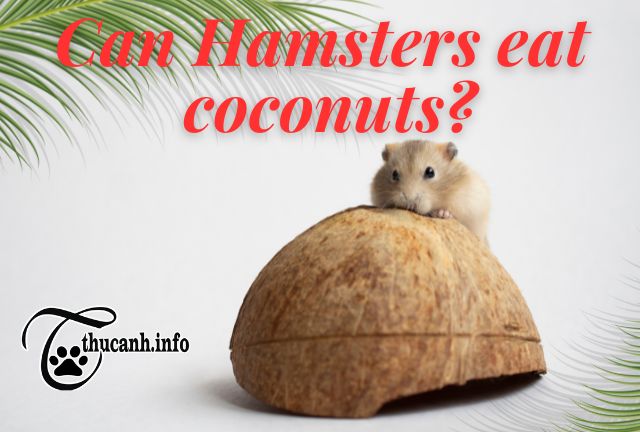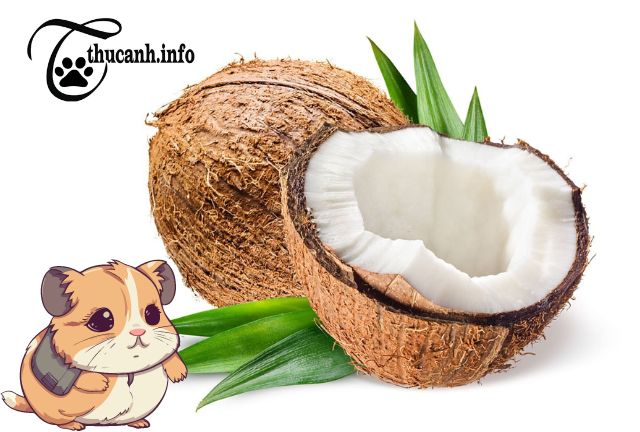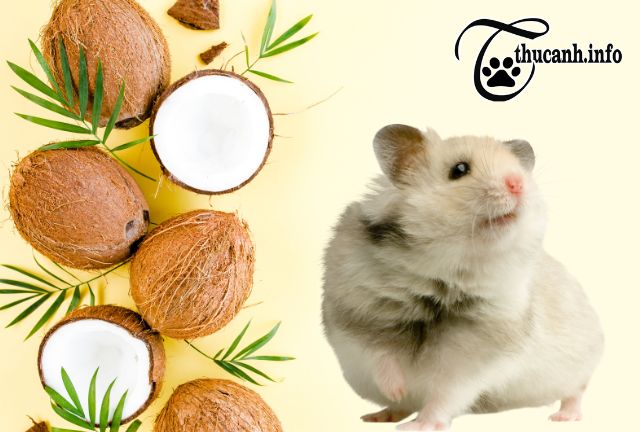Can hamsters eat coconut? Healthy hamsters need a balanced diet. Responsible pet owners may question if their pets can consume coconut. This page covers coconut’s nutritional advantages, dangers, and safe preparation for hamsters.

Is it good or bad for hamsters to eat coconuts?
1. Can Hamsters eat Coconut?
Hamsters can consume coconut moderately. Hamsters can eat coconut, but only in little amounts as a reward. Coconut has healthful lipids and minerals hamsters need. However, hamsters need a balanced commercial hamster food diet.
Give your hamster unsweetened, additive-free coconut. Give them coconut flakes or fresh coconut chunks. When initially feeding coconut, watch your hamster’s reaction and digestion. Stop feeding coconut and see a vet if stomach discomfort or allergies occur.
2. Coconut Nutrition for Hamsters?
Moderate coconut consumption improves hamsters. Coconut provides hamsters with these nutrients:
Coconut contains healthful medium-chain triglycerides (MCTs). Hamsters use these fats for energy and wellness. Coconut nutrients per 100 grams are shown below.
| Nutrient | Percent | Benefit |
|
Calories (Kcal) |
354 |
Provides energy |
|
Carbohydrates (g) |
15 |
Fuel for the body |
|
Fiber (g) |
9 |
Promotes digestive health and satiety |
|
Protein (g) |
3 |
Supports growth and repair of body tissues |
|
Fat (g) |
33 |
Provides healthy fats for energy |
|
Vitamin C (mg) |
2 |
Boosts immune system |
|
Vitamin E (mg) |
2 |
Antioxidant, supports skin health |
|
Iron (mg) |
13 |
Important for oxygen transport in the body |
|
Potassium (mg) |
12 |
Regulates blood pressure and heart health |
|
Magnesium (mg) |
17 |
Supports bone health |
3. Is Coconut Dangerous for Hamsters?
Hamsters can benefit from coconut, but there are hazards and concerns. Important considerations:
- Coconut is rich in saturated fats. High-fat diets can cause hamster obesity and health problems. Coconut should be served sometimes as a treat.
- Coconut’s high fiber content may cause digestive issues in certain hamsters. To avoid diarrhea or bloating, introduce coconut slowly and watch your hamster’s reaction.
- Coconut is fibrous and can choke hamsters. To avoid choking, provide little chunks.
- Coconut allergies are unusual in hamsters. Watch for allergic responses such as itching, swelling, and respiratory trouble. If allergic symptoms emerge, stop feeding coconut and see a vet.
- Moulds and Contamination: Coconuts may grow molds and germs if improperly kept or old. Your hamster needs a fresh, unspoiled coconut.

How Much Coconut Should You Give to Your Hamster?
4. Hamster Coconut Dosage
Coconut for hamsters should be moderated. Coconut has certain health advantages, but it should be a treat rather than a staple. Some guidelines:
- Serving Size: Give a hamster a thumbnail-sized coconut treat. This assures a modest quantity with little fat and fiber.
- Limit coconut treats to twice a week. Coconut can cause stomach difficulties and weight gain.
- Variety: Hamsters need a variety of diets for balanced nutrition. Coconut should be a tiny element of their diet.
- Observe your hamster’s coconut reaction. Check their digestion, behavior, and health. Reduce or remove coconut if they have intestinal troubles.
5. Can Hamsters Eat Other Fruits and Vegetables?
Hamsters’ balanced diets include fruits and vegetables. Safe choices:
- Apples: Remove seeds and core and give little portions as treats.
- Carrots: Hamsters love carrots. Wash and chop them into manageable bits.
- Broccoli: Hamsters may eat broccoli florets for vitamins and minerals.
- Cucumber: Remove seeds and slice cucumber into thin rounds for a hydrating snack.
- Spinach: Give tiny amounts of nutritious fresh spinach leaves. Due to excessive oxalic acid, avoid overfeeding it.
- Blueberries: Offer these sweet, tiny berries occasionally. Sugar content requires management.
- Peas: Hamsters love thawed peas.
- Red, green, or yellow bell peppers: Remove seeds and pith and serve tiny slices.
6. Is Hamster Coconut Oil Safe?
Hamsters can utilize coconut oil in moderation. However, be careful and consider the following:
- External Use Only: Hamsters’ skin can be moisturized with coconut oil. Apply a modest quantity and prevent licking.
- Hamsters should not eat coconut oil. Coconut oil includes healthy fats, but hamsters get plenty from their food.
- Coconut oil might irritate hamsters’ delicate stomachs. Coconut oil overconsumption can cause diarrhea and stomach pain.
- Obesity: Coconut oil is heavy in fat, therefore overfeeding can cause weight gain and health problems. Hamsters should consume fresh veggies, good pellets, and rewards.
7. What Are Coconut-Allergic Hamster Signs?
Hamsters seldom have coconut allergies. Coconut allergy symptoms in hamsters include:
- Skin irritation: Redness, swelling, or itching, especially where the hamster touched coconut or coconut products.
- Fur Loss: Coconut allergy or inflammation causes excessive hair loss or uneven fur.
- Respiratory symptoms: Wheezing, coughing, or trouble breathing may suggest a hamster’s respiratory allergy.
- Digestive Issues: Coconut or coconut-based goods cause diarrhoea, vomiting, or bowel disturbances.
- Behavioral Changes: Allergic reactions can include restlessness, irritability, and reduced appetite.
8. How to Make Hamster Coconut?
Steps for preparing coconut for your hamster:
- Choose a fresh, whole coconut from a reliable supplier. Remove mold, cracks, and other damage.
- Remove the Husk: Carefully tap the coconut around its perimeter with a cleaver or hammer to split the outer husk. After cracking, remove the husk to reveal the hard shell.
- Crack the Coconut Shell: Use a hammer or other instrument to break the coconut shell. Avoid striking the inside flesh hard.
- After cracking the shell, gently extract the coconut meat. Spoon or knife the meat from the shell. Eliminate shell fragments.
- Cut the coconut meat into bite-sized pieces for your hamster. Avoid choking hazards like big pieces.
- Serve sparingly: Serve cooked coconut flesh occasionally. It should not be their main dietary source.
- Store properly: Refrigerate leftover coconut flesh in an airtight jar for a few days. Discard rotten items.

Questions about hamsters and coconuts
9. FAQs
9.1. Does coconut affect hamster digestion?
Hamsters love coconut, but too much or poor preparation might cause intestinal issues. Hamsters have trouble digesting coconut’s oil and fiber.
Coconut can cause diarrhea, upset stomach, and bloating in hamsters if overfed or improperly cooked. If consumed in excess, coconut fat can be harmful.
Hamsters should eat coconut moderately to avoid intestinal issues. As a reward, provide tiny, sugar-free coconut pieces. Before feeding your hamster white meat, remove the husk, shell, and brown skin.
9.2. Does coconut choke hamsters?
Yes, unprepared coconut may choke hamsters. Coconut flesh is fibrous and thick, making it hard for hamsters to chew and swallow big chunks.
Hamsters need little, bite-sized coconut to avoid choking. Cut coconut flesh into small, chewable pieces for your hamster. Avoid huge portions or chunks with strong fibres that might choke them.
9.3. What human foods should hamsters avoid?
Hamsters can eat fruits, vegetables, and hamster chow, however they should avoid some human foods owing to health hazards. Avoid these hamster foods:
Citrus fruits: Oranges, lemons, and grapefruits are too acidic for hamsters and may upset their stomachs.
Onions and garlic: Hamsters can get anemia from onions and garlic.
Chocolate: Hamsters cannot tolerate theobromine, which can be lethal.
Coffee, tea, and energy beverages can harm hamsters’ cardiovascular and neurological systems.
Sugary or salty foods: Candy, cookies, chips, and processed snacks can cause obesity, diabetes, and other health problems in hamsters.
Nuts, notably almonds, can choke hamsters and create intestinal issues.
Avoiding milk, cheese, and other dairy products since hamsters are lactose intolerant.
9.4. Are Dwarf Hamsters Coconut-Eating?
Dwarf hamsters may consume coconut in moderation as a reward. Coconut contains beneficial lipids, fiber, and trace elements for hamsters. Coconut is heavy in fat and calories, so too much might cause weight gain or stomach difficulties.
Give your dwarf hamster well prepared, bite-sized coconut. Provide only the white coconut flesh. Avoid sweet or flavored coconut goods and dark skin.
In conclusion, coconut is a healthy and delightful treat for your hamster, but only in moderation and with a balanced diet. If overfed or allergic, coconut can harm your hamster.
Remove the coconut shell and give your hamster little chunks. If your hamster has any side effects, see your vet. “Can Hamsters Eat Coconut” on Thucanh.info could be helpful.


